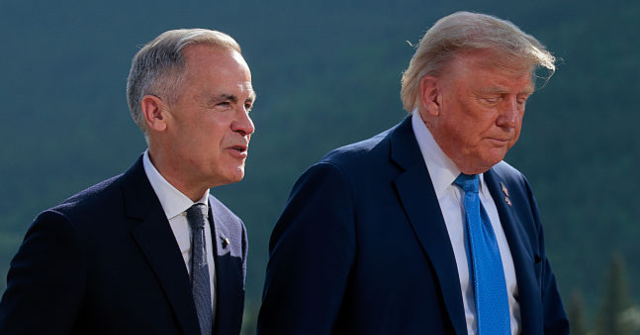Leftist Canadian Prime Minister Mark Carney told reporters on Tuesday that he believes it is possible a final trade agreement with the United States would still raise tariffs on Canadian goods, suggesting he may not win any negotiation with President Donald Trump.
Carney made the admission shortly before joining a cabinet meeting to discuss how to approach President Trump’s latest proposal: an increase in tariffs of Canadian goods to 35 percent if Ottawa continues not to help the United States contain the scourge of fentanyl and imposes tariffs on American goods that Washington deems unfair.
“There is not much evidence at this moment of agreements, arrangements, or negotiations with the Americans for any country, any jurisdiction, to have a tariff-free deal,” Carney said, according to the Globe and Mail. Carney reportedly promised that communication with Washington will “intensify” in the coming weeks in anticipation of the August 1 deadline for the 35 percent tariffs to take hold.
The Globe and Mail noted that he had not previously stated publicly that negotiations could potentially not erase all of President Trump’s tariffs, which became a major issue in the general election that Carney won this April.
“There are problems, obviously, in the automobile steel sector, aluminum, pharmaceuticals, and other areas that all need to be addressed. We need to stabilize the situation for Canada,” Carney stated on Tuesday, urging Canadians to “recognize the commercial landscape globally has changed” since Trump began his second term in office.
President Trump published a letter on his website Truth Social last week to Carney addressing current tariff negotiations, extending the previous deadline for concluding a complete trade deal to August 1 but expressing disappointment with the pace of the discussions.
On August 1, Trump wrote, a 35 percent tariff would apply on all Canadian goods “separate from sectoral tariffs” and will increase if Canada retaliates with more tariffs. The president noted that his administration “has agreed to continue working with Canada, despite Canada having financially retaliated against the United States” by imposing active tariffs in response to prospective future tariffs.
“I must mention that the flow of Fentanyl is hardly the only challenge we have with Canada, which has many Tariff, and Non-Tariff, Policies and Trade Barriers, which cause unsustainable Trade Deficits against the United States,” Trump wrote. “Canada charges extraordinary Tariffs to our Dairy Farmers – up to 400% – and that is even assuming our Dairy Farmers even have access to sell their products to the people of Canada.”
Carney, a lifelong finance professional with no political experience before becoming prime minister, led a dramatic turnaround for the ruling Liberal Party following the resignation of former Prime Minister Justin Trudeau, eroding a 26 percent Conservative lead documented early in the year.
Carney defeated Conservative Party Leader Pierre Poilievre largely by making the election about Trump. He consistently equated Poilievre with Trump — despite Trump openly endorsing Carney on television and calling Poilievre “stupid” — and said he would compromise too much in tariff talks with America.
The Canadian prime minister, who took over for Trudeau as an interim leader before the election, dramatically declared the American-Canadian relationship “over” as it once stood in March.
“We will need to dramatically reduce our reliance on the United States,” he emphasized. “We will need to pivot our trade relationships elsewhere… There will be no turning back.”
Carney continued to antagonize the White House throughout the election season.
“We are going to fight these tariffs with countermeasures. We are going to protect our workers and we are going to build the strongest economy in the G7,” Carney declared on April 2 in response to President Trump’s announcement of a series of tariffs on American trade partners — that notably excluded Canada. “In a crisis, it’s important to come together and it’s essential to act with purpose and with force, and that’s what we’re going to do.”
Carney’s strident tone regarding Trump changed rapidly following his sound defeat of Conservative rival Poilievre. In May, the prime minister visited the White House and lauded Trump as a “transformational president” and suggested he would govern similarly.
“You’re a transformational president, focused on the economy, with a relentless focus on the American worker, securing your borders… ending the scourge of fentanyl and other opioids, and securing the world,” Carney praised.
“I’ve been elected… with the help of my colleagues here, I’m going to spread the credit, to transform Canada with a similar focus on the economy, securing our borders, again, on fentanyl,” he continued, “much greater focus on defense and security, securing the Arctic and developing the Arctic.”
At the G7 summit in June, which Carney hosted, the prime minister credited Trump for his wisdom and boldness.
“Nostalgia isn’t a strategy,” Carney stated. “We have to change with the times and to build a better world, and some of you, such as you, Mr. President, have anticipated these massive changes and are taking bold measures to address them.”
Poilievre appeared to mock Carney on Tuesday for failing to uphold his campaign promise to be tough with Trump.
Tariffs, he quipped, were “another unilateral concession from a man who said he would never back down to the U.S. president.”
Follow Frances Martel on Facebook and Twitter.
Read the full article here
